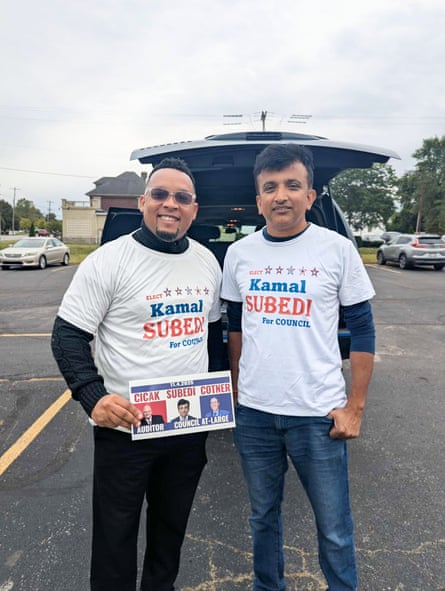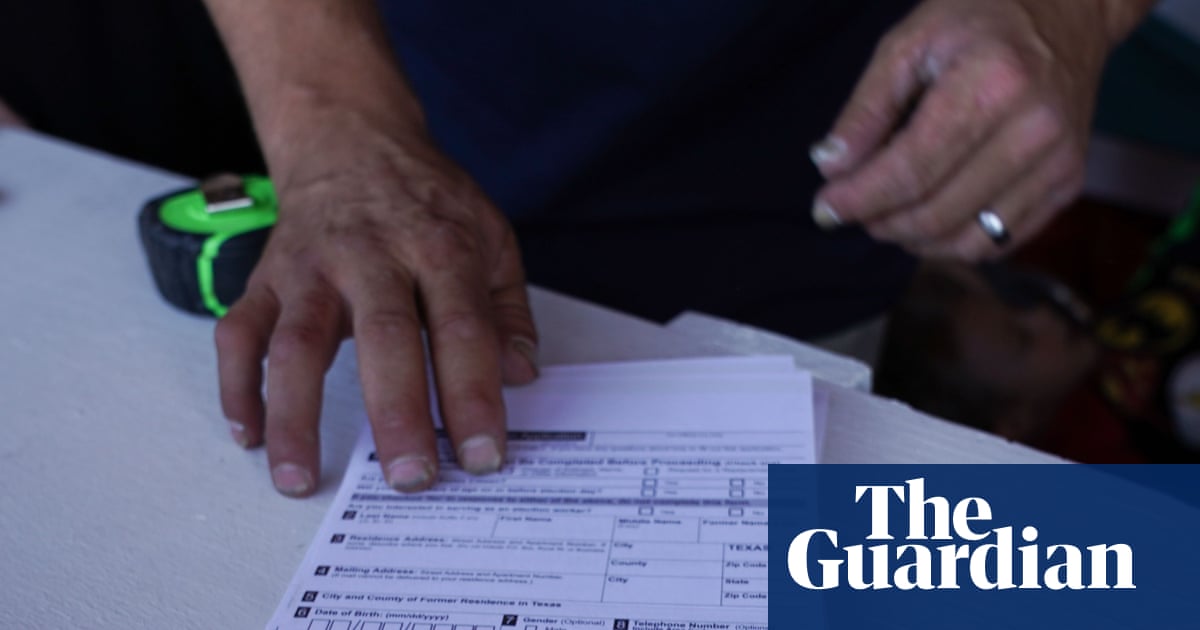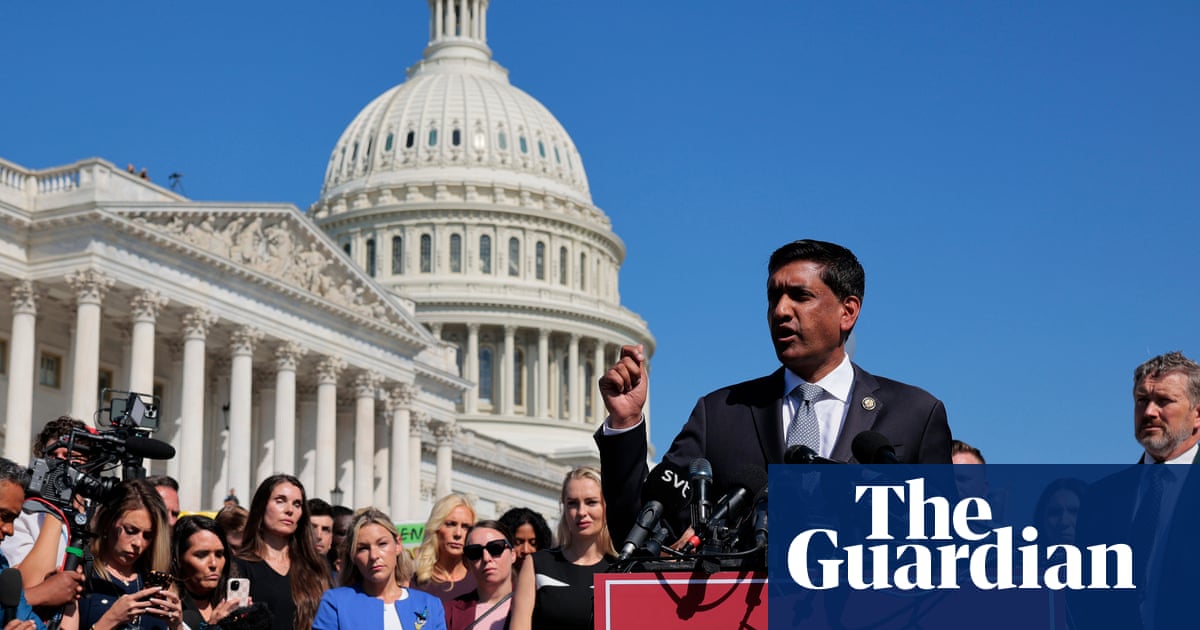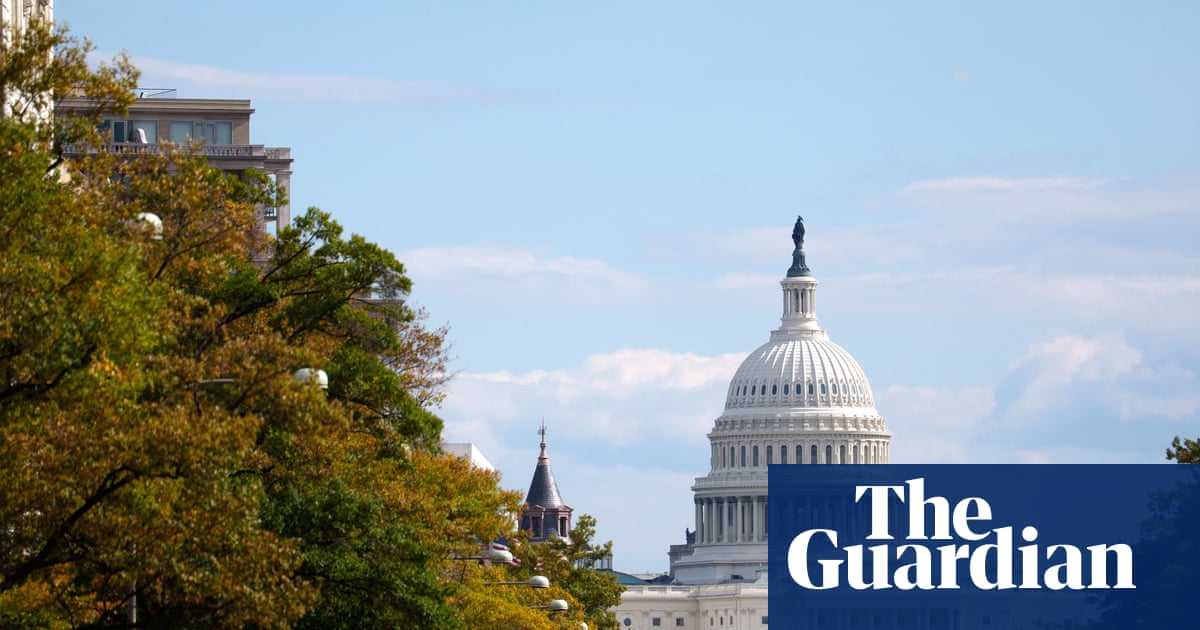Almost 32 years ago, in a refugee camp in eastern Nepal, children sat cross-legged around a small blackboard propped on the dirt, repeating the alphabet in sing-song rhythm. Among them was Bhuwan Pyakurel, a fourth-grader, and his teacher, Kamal Subedi, barely 18.
“He was tall, thin, and very talkative,” Subedi said, now 52. “We didn’t know what would happen tomorrow. So we went hut to hut, gathering kids to learn.” In the early 1990s, thousands of Bhutanese refugees had arrived across seven camps in the region, each day bringing more families, more children, and more uncertainty.
Three decades later, the former teacher and student live a few miles apart in Reynoldsburg, Ohio, and on opposite sides of a US political divide. Pyakurel is now a Democratic city councilman and the first Bhutanese refugee elected to public office in the United States. Subedi, his former teacher, is running for another seat on the council as a Republican on 4 November.
Their race has split the small but influential Bhutanese community in suburban Columbus. But the debate over Subedi’s candidacy has spread far beyond Reynoldsburg. Across Facebook and WhatsApp groups from Pennsylvania to Minnesota, members of the Bhutanese diaspora are weighing in – posting hundreds of comments, endorsements and rejections.
Some see Subedi’s candidacy as a sign of maturity, proof that refugees can belong to and shape either party. Others, including Pyakurel, see it as a betrayal, aligning their story of exile with a party that, in recent years, deported dozens of Bhutanese refugees and cut social programs many families rely on.
“When people with refugee backgrounds like Subedi run on the Republican platform, I see it as them standing against me, my children, my community, and my values,” Pyakurel said. “It feels like they’re rejecting the ideals this country was built on. If you support that kind of politics, you should be ashamed.”
Subedi argues that change comes from participation. “If we never join the Republican Party, we’ll always be isolated from it,” he said. “If we take part, we can help shape the narrative to include us.”
Pyakurel was nine when Bhutan carried out the mass expulsions of its Nepali-speaking minority, forcing his family into the Goldhap refugee camp in eastern Nepal. Life there was defined by restrictions, no legal work, little movement and constant uncertainty. “You feel that otherness every day,” he said. “It plants a question in you: why don’t I get the same chance everyone else does?”
That chance came in 2009, when his family resettled in Colorado. There, through the Family Leadership Training Institute at Colorado State University, he learned the mechanics of civic participation.“It was the first course that made me think about running for local office,” he said.
Then in 2014, Pyakurel, then 35, and his family moved to Reynoldsburg, joining hundreds of other Bhutanese families. Two years later, he became a US citizen. “When I took the oath, the judge said, ‘You have two duties: vote and consider running for office.’ I walked out in tears.”
In 2019, when longtime Republican councilman Marshall Spalding sought re-election, Pyakurel decided to challenge him.

“When he decided to run for office, I just thought that was great,” said Steve Walker, 80, a longtime colleague and adviser. “To have the potential of a Bhutanese representative on the Reynoldsburg city council-that meant a lot. There’s a significant Bhutanese population here.”
Once a predominantly white and Republican suburb, Reynoldsburg’s population of roughly 40,000 people is now far more mixed politically and ethnically. Census data show the Black population rising from 10% in 2000 to 26% in 2020, while the white share fell from 86% to 63%. Approximately 8,000 Bhutanese refugees have made their home there, accounting for roughly one-fifth of the city’s population.
On the night Pyakurel announced his candidacy he felt his chest tighten as he climbed the steps to the microphone. “I don’t remember exactly what I said,” he recalled, laughing. “But people started clapping before I’d even finished.”
Pyakurel threw himself into the campaign the same way he had rebuilt his life as a refugee, one door at a time. “When I told them I was a refugee and why I wanted to serve, most people listened,” he said. “But sometimes they said things that were cruel or racist.”
His story still resonated with neighbors, with local Democratic leaders, and especially within the Bhutanese community.
That year, Pyakurel made history as the first Bhutanese refugee in the United States to be elected to public office. He won the ward three seat on the Reynoldsburg city council, defeating Spalding by a comfortable margin – proof, he says, that “refugees don’t just find a home in America, they help shape it for the better.”
Among Pyakurel’s earliest supporters was one of his former fourth-grade teachers from the Goldhap refugee camp, the soft-spoken Subedi. “I was so proud of him and everything he’d accomplished.”
After Nepal, Subedi’s family had resettled in Dallas, Texas, in 2008. “The first year was very rough,” he said. “We arrived in the middle of the recession. There were no jobs. I had a young son and my parents to take care of.”
He worked briefly for Catholic Charities in Dallas, then received a full scholarship to attend graduate school at Bowling Green State University in Ohio, where he completed a master’s in computational science in 2014. That same year, Subedi and his family migrated to Reynoldsburg, where he teaches physics as an adjunct professor at Columbus State Community College and runs a few small businesses.
Unlike his former student Pyakurel, who found his values aligned with the Democratic party, Subedi says he chose the Republican party because of his refugee background, not despite it.
“When I finally had to choose a party, I felt Republican principles matched the values I grew up with, Hindu faith, family, discipline, preserving language and culture,” he said. “We left Bhutan to protect those things.”
“It’s a mistake to assume refugees and immigrants automatically support Democrats. Many of us don’t,” he added.
In 2024, Subedi and a group of Bhutanese residents campaigned for Donald Trump in Ohio – a key swing state that Trump carried with 55% of the vote. Now, Subedi is running for city council as a Republican even as the Trump administration’s immigration crackdown has led to the deportation of dozens of Bhutanese refugees, including several from Columbus.
“I’ve already said deporting Bhutanese refugees is wrong. It’s one part of my party I don’t agree with,” Subedi said. “But when I compare that with open borders – where desperate migrants and even criminals cross without screening – I think both are serious problems.”
His candidacy has exposed deep divisions within the Bhutanese community in Reynoldsburg.
Charan Chamlagai, 42, who once canvassed for Pyakurel, sees Subedi’s Republican run as a positive step. “Subedi brings a different perspective,” he said. “He wants to change things from within and help our community understand the policies that affect us. Some Republican ideas align with our cultural and religious values. We should give him a chance.”
Others, though, see Subedi’s campaign as a betrayal.
“He’s supporting the Trump administration that deported our people,” said Harry Adhikari, 45. “By running as a Republican, he’s supporting the same system that would deport his own brothers and sisters. He’s not fixing potholes in our community – he’s creating them.”
Subedi acknowledged that the deportation of Bhutanese refugees is fundamentally un-American. At the same time, he argues that deportations are not unique to the Trump administration.
“Deportations didn’t start with President Trump,” he said. “President Obama deported more than three million people. This is a federal system.”
When pressed on the fact that no known Bhutanese refugees were deported under previous administrations, Subedi hesitated. “Deporting Bhutanese refugees is wrong,” he finally said. “I don’t like it.”
Decades after he was his student, Pyakurel has been outspoken about Subedi’s campaign.
“He’s a Democrat, and in politics it’s fair to challenge your opposition,” Subedi said. “But I think Bhuwan and others have mischaracterized me. They blame me for deportations I had nothing to do with. They treat me like an enemy. Bhuwan won’t even shake my hand anymore.”
When asked what might change his view, Pyakurel paused before answering. “If Subedi publicly denounced Trump, I’d support him.”
But Subedi hesitated when asked if he would take that stand.
“I don’t think it would be wise to denounce him openly,” he said. “He’s our commander-in-chief. And there are things Trump has done that I believe are good for this country – to protect it, to save it.”

 German (DE)
German (DE)  English (US)
English (US)  Spanish (ES)
Spanish (ES)  French (FR)
French (FR)  Hindi (IN)
Hindi (IN)  Italian (IT)
Italian (IT)  Russian (RU)
Russian (RU)  10 hours ago
10 hours ago
























Comments